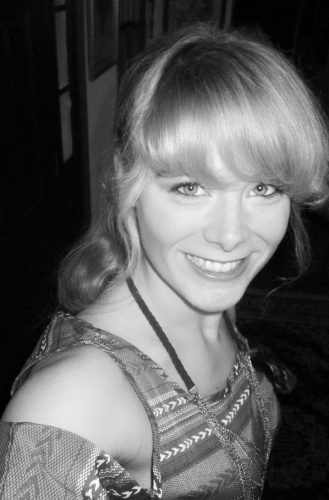
About Katharine E Wibell:
Katharine E. Wibell’s lifelong interest in mythology includes epic poetry like the Odyssey, Ramayana, Beowulf, and the Nibelungenlied. In addition, she is interested in all things animal whether training dogs, apprenticing at a children’s zoo, or caring for injured animals as a licensed wildlife rehabilitator. After receiving degrees from Mercer University in both art and psychology with an emphasis in animal behavior, Wibell moved to New Orleans with her dog, Alli, to kick start her career as an artist and a writer. Her first literary works blend her knowledge of the animal world with the world of high fantasy.
What inspires you to write?
Coming up with ideas has never been a problem. I began creating characters, worlds and backstories when I was growing up and have never stopped. I knew I needed to write those stories down so I could share them with others. The challenge lies in capturing all the stories in some way, shape, or form before I forget them.
What authors do you read when you aren’t writing?
I am a huge fan of ancient epic poetry and prose—the source material for mythologies. As a result, many of the books that I read do not have specific authors attributed to them. I do respect G.R.R. Martin, J.R.R. Tolkien, and J.K. Rowling for each took old myths and mythological entities that many people were unfamiliar with and, by incorporating them in their works, introduced them to new generations of readers.
Tell us about your writing process.
I write book series. When an idea for a new series comes to mind, the core plot points and characters manifest themselves right away. I can usually guess within a book or two what the length of the series will be.
As for writing, I typically approach the story linearly. I will block out all the major plot points and arrange them in order. Then, I will type the manuscript starting from the beginning. On the occasions when I come up with specific dialogue or an action sequence that occurs later in the book, I write it down so that I do not forget it. When I finally reach that specific chapter, I’ll plug that piece in.
For Fiction Writers: Do you listen (or talk to) to your characters?
Ha-ha. I don’t talk to my characters, but I will let them take control of the story. One character actually wrote himself into existence, and he eventually had some pretty important roles to play in that particular series. Although the core plot points never change, allowing characters to “live their own lives” has opened the door for some really neat subplots and backstories that I did not initially foresee.
What advice would you give other writers?
It is never too early to build your platform—your followers, fans, and subscribers. Even if your book has yet to be published, you can create your online identity, talk about your writing process, nerd out about literature and allow others to get to know you. When you do publish, you will already have a number of potential readers waiting to buy a copy of your book.
How did you decide how to publish your books?
I have tried to submit to literary agents in the past, and I do recommend others to do the same. Yet, I was never overly concerned if I did not get picked up as I always knew I would publish my book. Having met a few indie authors before starting down this path, I was rather confident that I would be able to navigate through the indie publishing world. However, I continuously try to learn as much as I can about all publishing avenues as well as marketing. Technology and interests are always changing. I never want to miss a new opportunity.
What do you think about the future of book publishing?
I think this question ties in nicely to the prior one. Although I think that there will always be large publishing companies as well as hardcover and paperback books, I recognize that both indie publishing and eBooks are becoming more and more prevalent. It is becoming easier for an individual to have a book published and distributed around the world. But that ease can bring new challenges. The easy ability to self-publish is flooding virtual bookstores with countless options, and that makes it that much harder for an author to be discovered. To stand out, writers must challenge themselves to deliver professional work from writing, editing, and formatting all the way through cover design.
What genres do you write?: Young adult, epic fantasy
What formats are your books in?: eBook, Print, Both eBook and Print
Website(s)
Katharine E Wibell Home Page Link
Link To Katharine E Wibell Page On Amazon\
Your Social Media Links
Goodreads
Facebook
Twitter
Pinterest
LinkedIn
Instagram
YouTube
All information in this post is presented “as is” supplied by the author. We don’t edit to allow you the reader to hear the author in their own voice.
